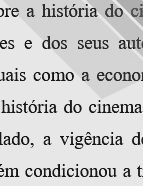

................................
The first history of cinema in a volume of its own was only published in Portugal in 1941, authored by film critic and film club director Manuel de Azevedo, under the title O Cinema em Marcha [Cinema on the Move] (Author’s edition, 1941). According to Jorge Pelayo (Bibliografia...[Bibliography…], 1971, p. 71), this work is so close to Usine de Rêves (Gallimard, 1936), by Ukrainian journalist and writer Illya Ehrenbourg, that "it is almost [its] condensed Portuguese translation ". However, it includes a brief chapter entitled "Portuguese Cinema" in which a philosophical rather than a true historiographical style is adopted. The work sold out, perhaps due to its novelty, and a second edition was published in 1944, this time by the Livraria Latina [Publishing House].
In 1943, a unique history was published: A História do Cinema vista através de Filmes Castello Lopes (Exposição Internacional de Arte Cinematográfica, 1943) [The History of Cinema seen through Castello Lopes Films (International Exhibition of Cinematographic Art)], by Mota da Costa, with evident advertising purposes. Indeed, the second work published in Portugal was História do Cinema [The History of Cinema] (Publicações Europa-América, 1949), the Portuguese translation of Histoire du cinéma (1942), by the French journalist of Italian origin Joseph-Marie Lo Duc. The same year was also the first known attempt to publish an ambitious history of cinema written from scratch by Portuguese authors. A Maravilhosa História da Arte das Imagens [The Marvellous History of the Art of Images] was coordinated by journalists and directors Fernando Fragoso and Raul Faria da Fonseca, edited in fascicles between 1949 and 1956, and constituted a joint effort by various authors to disseminate general data, although it lacked rigour in the analysis and problematisation of the information presented.
Ten years later, Livros Horizonte [Horizon Books Publishing House] launched História do Cinema Mundial [History of World Cinema], a concise Portuguese version of around 700 pages of the six volumes of Georges Sadoul's celebrated work (Histoire du cinéma mondial, Denoël, 1946-54), a comprehensive work that would become popular worldwide.
